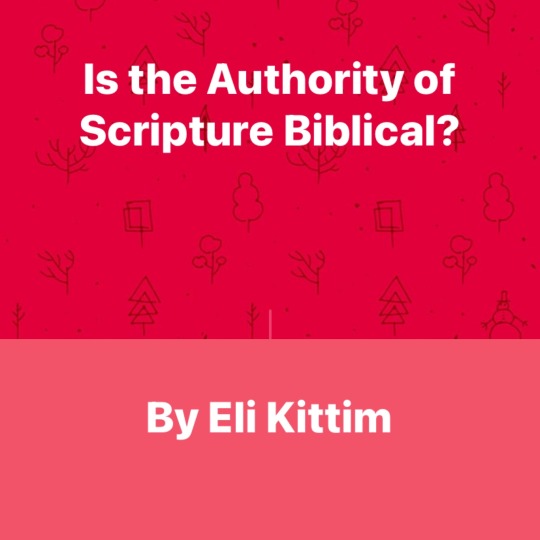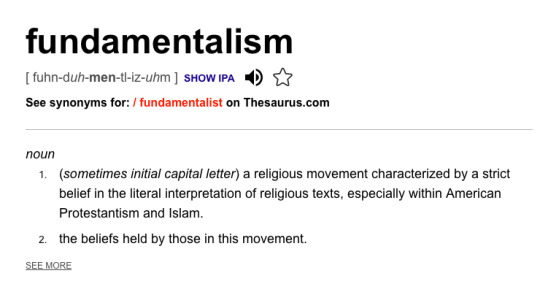#Inerrancy
Explore tagged Tumblr posts
Text
By: Eric W. Dolan
Published: Sept 20, 2024
A new study published in Proceedings of the National Academy of Sciences suggests that specific networks in the brain, when damaged, may influence the likelihood of developing religious fundamentalism. By analyzing patients with focal brain lesions, researchers found that damage to a particular network of brain regions—mainly in the right hemisphere—was associated with higher levels of fundamentalist beliefs. This finding provides new insight into the potential neural basis of religious fundamentalism, which has long been studied in psychology but less so in neuroscience.
Religious fundamentalism is a way of thinking and behaving characterized by a rigid adherence to religious doctrines that are seen as absolute and inerrant. It’s been linked to various cognitive traits such as authoritarianism, resistance to doubt, and a lower complexity of thought. While much of the research on religious fundamentalism has focused on social and environmental factors like family upbringing and cultural influence, there has been growing interest in the role of biology. Some studies have suggested that genetic factors or brain function may influence religiosity, but until now, very little research has looked at specific brain networks that could underlie fundamentalist thinking.
The researchers behind this study wanted to address a critical gap in understanding how brain lesions might affect religious beliefs, particularly fundamentalism. Prior research suggested that damage to the prefrontal cortex could increase fundamentalist attitudes, but this work was limited to small sample sizes and focused only on one part of the brain. The authors of the study hypothesized that instead of a single brain region being responsible, religious fundamentalism might arise from damage to a distributed network of connected brain regions.
“My primary interest is and has been mystical experience. But in the process researching the cognitive neuroscience of mystical experience, I came across brain network associations with religious fundamentalism,” study corresponding author Michael Ferguson, an instructor in neurology at Harvard Medical School and director of Neurospirituality Research at the Center for Brain Circuit Therapeutics.
To explore whether damage to specific brain networks could influence the likelihood of holding religious fundamentalist beliefs, the researchers used a method called lesion network mapping, which helps identify how different regions of the brain are connected and how damage to one area might disrupt related brain functions. The study involved two large groups of patients with focal brain damage, giving the researchers a unique opportunity to analyze how different types of brain lesions might be linked to religious beliefs.
The first group consisted of 106 male Vietnam War veterans who had sustained traumatic brain injuries during combat. These men, aged between 53 and 75 at the time of brain imaging, were part of a long-term study conducted at the National Institutes of Health. The second group included 84 patients from rural Iowa who had experienced brain injuries from various causes, such as strokes, surgical resections, or traumatic head injuries. This second group was more diverse in terms of gender and had a broader range of injury causes.
Both groups completed a scale designed to measure religious fundamentalism, which asked participants to respond to statements reflecting rigid and inerrant religious beliefs, such as the view that there is only one true religion or that certain religious teachings are absolutely correct and unchangeable.
For each participant, the researchers mapped the precise locations of their brain lesions using advanced imaging techniques like computerized tomography (CT) and magnetic resonance imaging (MRI). These scans were then analyzed using lesion network mapping to see how damage to certain brain areas was connected to changes in religious fundamentalism scores. The researchers also compared the brain lesion data to a larger database of lesions associated with various neuropsychiatric and behavioral conditions, which helped them understand how the brain regions linked to religious fundamentalism overlap with those involved in other psychological traits.
The researchers found that damage to certain areas of the brain, particularly in the right hemisphere, was associated with higher scores on the religious fundamentalism scale. Specifically, lesions affecting the right superior orbital frontal cortex, right middle frontal gyrus, right inferior parietal lobe, and the left cerebellum were linked to increased religious fundamentalism. In contrast, damage to regions such as the left paracentral lobule and the right cerebellum was associated with lower scores on the fundamentalism scale.
“The strength and reproducibility of the signal between psychological self-report measures of religious fundamentalism and the functional networks we identified in the brain surprised me,” Ferguson told PsyPost. “It increases confidence in the results.”
Interestingly, the researchers noted that the brain regions identified in this study are part of a broader network connected to cognitive functions like reasoning, belief formation, and moral decision-making. These areas are also associated with conditions like pathological confabulation—a disorder where individuals create false memories or beliefs without the intent to deceive. Confabulation is often linked to cognitive rigidity and difficulty in revising beliefs, characteristics that are also found in individuals with high levels of religious fundamentalism.
The researchers also found a spatial overlap between brain lesions associated with criminal behavior and this fundamentalism network, which aligns with previous research suggesting that extreme religious beliefs may be linked to hostility and aggression toward outgroups.
“It’s sobering, but one of the takeaway findings is the shared neuroanatomy between religious fundamentalism, confabulations, and criminal behavior,” Ferguson said. “It refocuses important questions about how and why these aspects of human behavior may be observed to relate to each other.”
The researchers emphasize that damage to this brain network does not guarantee that a person will develop fundamentalist beliefs, nor does it imply that individuals with strong religious convictions have brain damage. Instead, the findings point to the possibility that certain brain networks influence how people process beliefs and how flexible or rigid their thinking becomes, especially in the context of religion.
“A major caveat is that these results do not indicate that people with strong religious beliefs confabulate or that individuals high in religious fundamentalism commit crimes,” Ferguson explained. “Rather, our data may help us understand the style of cognitive or emotional processing that increase or decrease the probability of holding fundamentalism attitudes.”
The authors suggest that future research should explore how this brain network influences religious fundamentalism in more diverse populations, including people from non-Christian religious traditions or from different cultural backgrounds. It would also be valuable to study patients both before and after brain injuries to better understand how changes in the brain might affect religious beliefs over time. Additionally, research could investigate how this brain network relates to other types of belief systems, such as political ideologies or moral convictions, to see if similar patterns of cognitive rigidity or reduced skepticism emerge in these contexts.
“The personal beliefs of the authors span a broad continuum from adherents of religious faiths through agnosticism to atheism,” Ferguson noted. “We approach the weighty subject matter of this research as earnest seekers of scientific data and encourage readers to receive our results in the spirit of open-minded empirical inquiry driven by scientific curiosity and without prejudice or malice to any group or faith.”
The study, “A neural network for religious fundamentalism derived from patients with brain lesions,” was authored by Michael A. Ferguson, Erik W. Asp, Isaiah Kletenik , Daniel Tranel, Aaron D. Boes, Jenae M. Nelson, Frederic L. W. V. J. Schaper, Shan Siddiqi, Joseph I. Turner, J. Seth Anderson, Jared A. Nielsen, James R. Bateman, Jordan Grafman, and Michael D. Fox.
--
Significance
Religious fundamentalism is a global and enduring phenomenon. Measuring religious fundamentalism following focal brain damage may lend insight into its neural basis. We use lesion network mapping, a technique that uses connectivity data to identify functional brain networks, to analyze two large, independent datasets of brain lesion patients. We found a network of brain regions that, when damaged, are linked to higher religious fundamentalism. This functional network was lateralized to the right hemisphere and overlaps with the locations of brain lesions associated with specific neuropsychiatric and behavioral conditions. Our findings shed light on neuroanatomy that may influence the emergence of religious fundamentalism, offering implications for understanding the relationship between brain networks and fundamentalist behavior.
Abstract
Religious fundamentalism, characterized by rigid adherence to a set of beliefs putatively revealing inerrant truths, is ubiquitous across cultures and has a global impact on society. Understanding the psychological and neurobiological processes producing religious fundamentalism may inform a variety of scientific, sociological, and cultural questions. Research indicates that brain damage can alter religious fundamentalism. However, the precise brain regions involved with these changes remain unknown. Here, we analyzed brain lesions associated with varying levels of religious fundamentalism in two large datasets from independent laboratories. Lesions associated with greater fundamentalism were connected to a specific brain network with nodes in the right orbitofrontal, dorsolateral prefrontal, and inferior parietal lobe. This fundamentalism network was strongly right hemisphere lateralized and highly reproducible across the independent datasets (r = 0.82) with cross-validations between datasets. To explore the relationship of this network to lesions previously studied by our group, we tested for similarities to twenty-one lesion-associated conditions. Lesions associated with confabulation and criminal behavior showed a similar connectivity pattern as lesions associated with greater fundamentalism. Moreover, lesions associated with poststroke pain showed a similar connectivity pattern as lesions associated with lower fundamentalism. These findings are consistent with the current understanding of hemispheric specializations for reasoning and lend insight into previously observed epidemiological associations with fundamentalism, such as cognitive rigidity and outgroup hostility.
==
Two of the authors of the above paper also published the following:
Abstract
Background
Over 80% of the global population consider themselves religious, with even more identifying as spiritual, but the neural substrates of spirituality and religiosity remain unresolved.
Methods
In two independent brain lesion datasets (N1 = 88; N2 = 105), we applied lesion network mapping to test whether lesion locations associated with spiritual and religious belief map to a specific human brain circuit.
Results
We found that brain lesions associated with self-reported spirituality map to a brain circuit centered on the periaqueductal gray. Intersection of lesion locations with this same circuit aligned with self-reported religiosity in an independent dataset and previous reports of lesions associated with hyper-religiosity. Lesion locations causing delusions and alien limb syndrome also intersected this circuit.
Conclusions
These findings suggest that spirituality and religiosity map to a common brain circuit centered on the periaqueductal gray, a brainstem region previously implicated in fear conditioning, pain modulation, and altruistic behavior.
--
For reference, I previously posted about a similar study from 2017:
Abstract
Beliefs profoundly affect people's lives, but their cognitive and neural pathways are poorly understood. Although previous research has identified the ventromedial prefrontal cortex (vmPFC) as critical to representing religious beliefs, the means by which vmPFC enables religious belief is uncertain. We hypothesized that the vmPFC represents diverse religious beliefs and that a vmPFC lesion would be associated with religious fundamentalism, or the narrowing of religious beliefs. To test this prediction, we assessed religious adherence with a widely-used religious fundamentalism scale in a large sample of 119 patients with penetrating traumatic brain injury (pTBI). If the vmPFC is crucial to modulating diverse personal religious beliefs, we predicted that pTBI patients with lesions to the vmPFC would exhibit greater fundamentalism, and that this would be modulated by cognitive flexibility and trait openness. Instead, we found that participants with dorsolateral prefrontal cortex (dlPFC) lesions have fundamentalist beliefs similar to patients with vmPFC lesions and that the effect of a dlPFC lesion on fundamentalism was significantly mediated by decreased cognitive flexibility and openness. These findings indicate that cognitive flexibility and openness are necessary for flexible and adaptive religious commitment, and that such diversity of religious thought is dependent on dlPFC functionality.
--
It should be noted that fundamentalism is not exclusive to (traditional) religions.
“… fundamentalism, properly understood, is not about religion. It is about the inability to seriously entertain the possibility that one might be wrong. In individuals such fundamentalism is natural and, within reason, desirable. But when it becomes the foundation for an intellectual system, it is inherently a threat to freedom of thought.” -- Jonathan Rauch, “Kindly Inquisitors: The New Attacks on Free Thought”
Flat Earth, anti-vax and wokery (modern feminism, "anti-racism," "gender identity" ideology, fat activism, etc) are all fundamentalist in nature. There is no evidence you can present to disabuse them of the tenets of their faith.
This phenomenon creates a problem for society in dealing with fundamentalist and false beliefs, especially when they have attained cultural dominance and institutional power. And particularly when they're held to be inerrant and absolute, and those who hold them regard dissent as heresy, and those who follow available evidence as evil heretics.
A good test for this is to look at the reaction when the belief is questioned; is the questioner regarded as factually wrong or morally suspect?
#fundamentalism#religious fundamentalism#false beliefs#inerrancy#unfalsifiable#religion#religion is a mental illness
31 notes
·
View notes
Text
“The Bible never claims to be the Word of God.”
This statement admittedly is still one I wrestle with because the meaning of those last three words can easily vary depending on who you ask.
On a factual basis, the statement is true. Since the Bible wasn’t fully compiled until some centuries after Jesus, one can’t just assume that phrases and verses denoting themselves (like in Hebrews) as the word of God are referring to the entire biblical canon as we know it. The author would’ve intended it to be more specific to what they were writing at the time or to older texts like the Torah and even what we now consider deuterocanonical or pseudographical texts.
On the other hand, the word of God can be seen in a more spiritual and wisdom sense, inspiration, the living text that guides us as we learn and read from it, learn about God, learn about humanity and our preciousness and fallenness and whatnot, how we ought to live in honor of God, with our neighbors and ourselves.
It’s an interesting tension going on here. If we’re talking biblical inerrancy, I no longer fully adhere to the concept (at least the definition of it according to the Chicago Statement of Biblical Inerrancy in the 70s which is a much more recent development that arguably stemmed from political underpinnings of its time). I take these anthropological aspects of the Bible just as seriously as I do with its significance and “authority” in my life.
(I put authority in quotation marks so people don’t misunderstand me and think the Bible is like the emperor of my life telling me exactly what to do).
But this is why I claim the Scriptures are infallible now rather than inerrant or even "perfect" in our human sense of the word, because in the end, I believe that God's Spirit still reveals Himself through the very human words of the ancients, but that God has plenty of room for us to wrestle with Him over its content that are much more unclear to us now than it might have been years ago. And this time I’m trying to exercise patience with myself in figuring things out and that being uncertain is a perfectly okay place to be with God as long as I keep trusting in Him.
11 notes
·
View notes
Text
Will Kinney's False Dichotomy
He always presents you with an either or with the question, "Can you show me a copy of any Bible today that you believe is the 100% inerrant, infallible word of God?" As you will soon see, the history of the Bible's development gives more than a yes or no
He always presents you with an either or with the question, “Can you show me a copy of any Bible today that you believe is the 100% inerrant, infallible word of God?” The only answer you can pick to get his question right is the King James Version, and the reason for this is because he says it is. He believes that either God preserved his word 100% completely perfect in the King James Version, or…
#Bible Translation#Inerrancy#Infallibility#Inspiration#King James Bible#King James Only#King James Onlyism#King James Version#KJB#KJV#KJV Onlyism#KJVO#Original Languages#Preservation#Textual Criticism
0 notes
Text
youtube
#whowasthepharaohattheexodus#exodus#exodustvtamil#bible#biblia#pharaohofmoses#ExodusPharaoh#PharaohIdentification#BiblicalChronology#AhmoseEra#AncientEgypt#HistoricalDebate#RamsesII#ArchaeologicalEvidence#Africanus#AncientHistory#moses#israelsexodus#storyofmoses#mosesbible#thelifeofmoses#JoelKramer#Christianarchaeology#Bibleteaching#biblicalapologetics#apologetics#Christian#ExpeditionBible#inerrancy#archaeology
0 notes
Text
Latter-day Saint Views on the Bible: A Comparative Analysis
Latter-day Saints (LDS) hold the Bible in high regard, recognizing it as the word of God. However, they believe its teachings must be interpreted correctly. This unique perspective is foundational to their faith
Photo by Rachel Strong on Unsplash Words carry immense significance in any discourse, especially when discussing religious beliefs and doctrines. In their latest post, the writer at Life After Ministries blog attempts to utilize 1 Timothy 4:16 to critique what they term the “lies of Mormonism.” The writer emphasizes that Christians should heed not just God’s words, but also be aware of the…

View On WordPress
#8th Article of Faith#Apocrypha#Bible#Book of Mormon#Canonization#Christian History#Christianity#Council at Carthage#Dead Sea Scrolls#Documentary hypothesis#Ezra Taft Benson#faith#Gutenberg Press#Inerrancy#Infallibility#King James Version#Latin Vulgate#Masoretic Text#New Testament#Old Testament#scripture#Septuagint#Textual Criticism#Textual Variants#Theology#Tyndale#Wycliff
0 notes
Text

Is the Authority of Scripture Biblical?
Eli Kittim
I have a high view of Scripture. But my authority is a Person, not a Book. My authority is God himself, as he reveals to me his will and purpose through spiritual communications. It’s one thing to say that the Bible is “authoritative,” in the sense that it’s reliable and truthful. But it’s quite another thing to say that it’s our highest authority. I think people mistakenly conflate the authority of Scripture with Cessationism, the Calvinist doctrine that spiritual gifts and prophecy ceased with the Apostolic Age. They often cite Jude 1:3 for support. But all that verse says is that “the faith” was revealed to us at some point in human history. It doesn’t say that the Godhead went out of business, took a Sabbatical, or died and left a will. The phrase—“the faith delivered once for all to God's people”—can be disambiguated by examining the context. The other passage cessationists love to quote is 1 Cor. 13:9-10. But all it says is that “we know in part and prophesy in part” because “when the perfect comes, the partial will be done away with.” But not before the complete comes. That’s the key! It doesn’t say that prophecy has ceased. That would be a misinterpretation. Besides, Acts 2:17 says that people in the end times will prophesy and see visions.
Many people are confusing Scripture’s inspiration, revelation, truthfulness, and inerrancy with the concept of “authority,” which the Oxford languages dictionary defines as “the power or right to give orders, make decisions, and enforce obedience.” In short, our highest authority is not the Church, tradition, councils, committees, or even the Bible itself. Our highest authority is Jesus Christ! In Matt. 28:18 (NASB), Christ says:
“All authority in heaven and on earth has
been given to Me”
Where does 2 Tim. 3:14–16 mention the authority of Scripture? It says that “the sacred writings … are able to give you the wisdom that leads to salvation through faith which is in Christ Jesus.” In other words, Scripture gives us wisdom and leads us to salvation which can only be found in Christ Jesus. The fact that Scripture is “inspired” doesn’t mean it represents the final authority. 2 Tim. 3:14–16 reads:
“continue in the things you have learned
and become convinced of, knowing from
whom you have learned them, and that
from childhood you have known the sacred
writings which are able to give you the
wisdom that leads to salvation through faith
which is in Christ Jesus. All Scripture is
inspired by God and beneficial for teaching,
for rebuke, for correction, for training in
righteousness.”
The fact that Scripture is God-breathed (2 Tim. 3:16) doesn’t mean that the Bible has the final say in all matters. The Spirit that inspired the Bible is the ultimate authority on all matters, not the Bible. Scripture itself does not claim to have all authority. Jesus does.
Moreover, the concept of the Sufficiency of Scripture implies that Scripture itself is all we need to interpret Scripture. But Scripture can be interpreted in 30,000 different ways. Just look at all the Protestant denominations that split due to interpretative differences. Thus, Scripture is neither sufficient to interpret itself, nor is it the final authority. Without the Holy Spirit to illuminate us, we will inevitably misinterpret it (Jn 16:13)!
Where does 2 Pet. 1:20–21 mention the authority of Scripture?
“But know this first of all, that no prophecy
of Scripture becomes a matter of
someone’s own interpretation, for no
prophecy was ever made by an act of
human will, but men moved by the Holy
Spirit spoke from God.”
All it says is that prophecy and its interpretation should be revealed by the Holy Spirit, not interpreted by human beings. If anything, it demonstrates the insufficiency of Scripture!
The fact that the Bible contains the Word of God doesn’t necessarily mean that it’s the final authority, or that it’s sufficient in and of itself, so that we don’t need anything else. If the Bible is entirely “sufficient” and adequate for all purposes, we wouldn’t need to be reborn. All we would need to do is read our Bibles. But Scripture cannot save anyone. Jesus does. The Spirit is what we need. We can be saved by the Spirit without the Bible. But we can’t be saved by the Bible without the Spirit.
The Bible does not attest to its own authority. Revelation of the Word does not mean ultimate Authority. The fact that God’s Word is true (Jn 17:17) doesn’t mean that the Bible is the highest authority in our lives. As Christ said, it is the Spirit that perfects us, not the Scriptures (Jn 16:13). Luke 24:49 reads:
“But remain … until you have been clothed
with power from on high”
John 3:5 says categorically and unequivocally:
“unless someone is born of … the
Spirit, he cannot enter the kingdom of God.”
Likewise, Romans 8:9 puts it thusly:
“But if anyone does not have the Spirit of
Christ, he does not belong to Him.”
In John 5:39-40, Jesus demonstrates the insufficiency of Scripture by saying the following:
“You examine the Scriptures because you
think that in them you have eternal life; and
it is those very Scriptures that testify about
Me; and yet you are unwilling to come to Me
so that you may have life.”
When Jesus says that all will be accomplished according to his Word (Matt. 5:18), he’s talking about prophecy, not the authority of Scripture. I’m not suggesting that Scripture errs or is contradictory. Absolutely not! But let’s not confuse the issues. The fact that the Bible contains the Word of God doesn’t necessarily mean that it’s our final authority, or that it’s entirely sufficient. That would be equivalent to Bibliolatry. The Bible is not a paper Pope. Truth and trustworthiness is one thing. Authority is another.
#Authority of scripture#Sufficiency of Scripture#spiritual transformation#spiritual communication#divine inspiration#divine revelation#inerrancy#elikittim#the little book of revelation#godbreathed#bible study#ελικιτίμ#το μικρό βιβλίο της αποκάλυψης#biblical interpretation#regeneration#final authority#rebirth#Cessationism#holy spirit#Spirit of Christ#the word of god#paper pope#Bibliolatry#ek#heresy#heterodox#sola scriptura#bibliology#soteriology#pneumatology
1 note
·
View note
Text
This translation knocked the wind out my sails
Browsing YouTube recently, I saw this video in my feed. (See image above). I immediately noticed the caption showing 2Corinthians 5:14-17, one of my original ‘go to’ verse references for teaching and encouraging the study of the Bible rightly divided. I thought, WOW!!! I have never seen or heard of many preachers who teach this passage, because it is very controversial. I wanted to know what this…

View On WordPress
#bible#corruption#dispensational#inerrancy#infallibility#king james bible#purified#rightly dividing#translation#truth#word
0 notes
Text
A Facelift Proposed on the Doctrine of Inerrancy
God guided the circumstances in which the biblical literature was divinely inspired, and God approved the final product
The Chicago Statement on Biblical Inerrancy is just a little older than my Christian faith. It was relatively new when I first read the Bible in college and when I first asked Jesus to be the Lord and Savior of my life. I have wrestled with the idea of inerrancy from the beginning of my Christian life until now. It isn’t that I don’t think the Bible is the “word of God”. It isn’t that I don’t…

View On WordPress
0 notes
Text
The Bible

View On WordPress
0 notes
Text
Do we really believe in Sola Scriptura?
I believe in Sola Scriptura. I stand on it theologically in everything. Sola Scriptura literally means Scripture alone, meaning that Scripture alone is our authority.
Why does Sola Scriptura matter to biblical womanhood? Because without the authority of Scripture, there is no case for biblical womanhood. No Titus 2: 3-5. No Proverbs 31 woman. Without Sola Scriptura, we have nothing. I stand on Sola Scriptura. I stand on it theologically in everything. Sola Scriptura literally means Scripture alone, meaning that Scripture alone is our authority. I’m a Titus 2…

View On WordPress
#5Solas#biblical womahood#Feminism#Five Solas#Genesis#heaven#inerrancy#infallibility#Jesus#manhood and womanhood#Reformed#Reformed Baptist#Reformed Congregational church#Reformed tradition#salvation#Scripture#six day creation#Sola Scriptura#TULIP#universal flood#young earth
1 note
·
View note
Text
A Pastoral Reflection on Inerrancy
By: T. J. Gentry, D.Min., Ph.D. | November 5, 2023 (This article was prompted by questions submitted to the Bellator Christi site after my recent interview with Dr. Brian Chilton discussing the importance of inerrancy. Here, I offer a pastoral reflection on inerrancy.) I am a pastor and an academic, but my academic training in Scripture and other areas is for the sake of my pastoral ministry,…

View On WordPress
0 notes
Text
Religious fundamentalism hangs by a thin thread
It occurs to me this morning that religious fundamentalism hangs by a very thin thread. That’s why it’s guarded so assiduously. The thread is that every word of an ancient and powerful book is, in fact, the very word of God for all time. Since most people don’t actually read those books they don’t realize that they already have decided certain of those words no longer apply, but they accept the…

View On WordPress
0 notes
Text

Attributes, Qualities, Quirks
Inerrant
19 notes
·
View notes
Text
Idk who needs to hear this, but Bible Literalism is a distinctly Christian thing.
Please stop applying it to Jewish allegories. You will miss the point of them entirely, every time.
#jewish#we do not believe our story book is the inerrant word of God#you are perpetuating Christian supremacy when you apply their lens to our stories
7 notes
·
View notes
Text
Still such a bizarre and freeing thought that I've been going to church because I want to, because I enjoy it, rather than the shame-laced obligation I was raised on. Refreshing and empowering
#I'm still pretty much just a christian for a couple hours a week and an agnostic/atheist the rest of the time#i like the singing together and the pageantry and the choir. Especially knowing the episcopal church is not like morally against me#and that biblical inerrancy is never even thought of. I love the community and the shared emotional tones#and the church is also gorgeous and the organ and organist and the choir! Choirs! Amazing
4 notes
·
View notes
Text
Rip to the founding fathers. They would've loved Doritos.
#weekly reminder that they were in their 20s and mostly rich and drunk a lot#the way ppl treat the constitution like the bible is weird and kinda gross#look at this inerrant document that def applies to the modern world seamlessly#im js if they got beamed here from the continental congress to 2023 they wouldnt be in dc#theyd be in florida begging women with body hair to do jello shots and saying shit like#look at that wagtail i wanna spend a night in her custom house#and its a simple game john if youve done what they say you sluice your gob#and look at the double jugg on that chap... no molly#and ive never been with a black woman i didnt own#and its just ridiculous that theyre deified#the founding fathers wouldnt stand for this#bruh the founding fathers would immediately eat 7 edibles and die of dehydration on rule 34 dot com shut up#uhhh *24 im not retyping that shit lol
9 notes
·
View notes